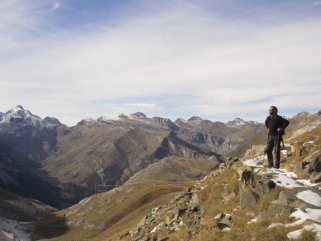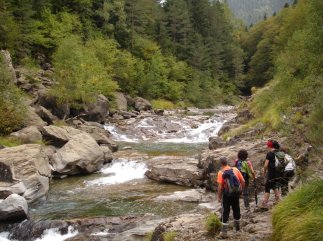Travel responsibility
On walking trips
Self-guided walking has its inherent risks. It is a sport where safety depends upon the judgement and alertness of the participants. S-Cape Travel is concerned about client safety and we go to great lengths to provide correct, detailed and up-to-date information in our route descriptions.
It is very important for each participant to be conscious of his/her responsibility to heed the information given in our route descriptions and apply these, USING COMMON SENSE.
 |
 |
When out walking, you are responsible for the way you act and the decisions you make. At times this may involve walking on a varied terrain (uneven surfaces, wet/muddy/slippery sections, loose rock, poor visibility, etc.) that can present difficulties and challenges that should not be underestimated. In these situations it is of utmost importance that the participant uses a great deal of caution and common sense as some routes can become dangerous and unsafe if the person has not taken sufficient care, is not dressed appropriately and does not have adequate physical and/or technical ability.
The walking routes on this programme follow official paths. On these routes there are places where the path crosses a stream (or dry streambed). You will often NOT find bridges, since these are streams which you can walk across with your boots on or by using stepping stones. In spring and autumn, the depth of some streams may increase and you may have to take your boots off and wade across (through ankle-deep or slightly higher water). We would NOT recommend wading across when water levels are above the knee!
Stepping stones can be slippery so pay special attention when crossing and use your trekking poles for balance. It is best to walk on the stream bed rather than on top of the stones specially if they are wet, mossy or muddy.
On cycling trips
Bicycle touring implies certain inherent risks. It is a sport in which safety depends on your own judgment and alertness as a cyclist.
Neither we, nor the local agent, can be held responsible for possible damage (physical or otherwise) to participants due to: physical activity during the tour, failure to follow road regulations, alcohol consumption, breaking of means or materials, lack of medical assistance in remote areas or other unforeseen circumstances.
 |
As a cyclist you are responsible for the way you ride and the condition of your bicycle. At times this may involve riding on varied terrain (uneven surfaces, wet/muddy/slippery sections, loose rock, poor visibility, etc.) with certain difficulties and challenges that should not be underestimated. In these situations the cyclist must use a great deal of caution and common sense, as some routes can become dangerous and unsafe if the cyclist does not take sufficient care and does not have the proper gear or adequate physical/technical ability.
You should always consider which side of the road you should be using, especially after taking a break when your mind may switch off.
When travelling on quiet country roads you should always be mindful of the possibility of traffic at any time and always cycle in a safe position on the road.
Safety
▶ Use common sense and caution at all times.
▶ Always keep an eye open for potentially dangerous situations (difficult terrain, sheer drops, changing weather conditions, etc.).
Bike Rental
► On all our bike tours, we offer optional rental services of bikes in different sizes and types, depending on the characteristics of the trip and the terrain.
► As this is a self-guided holiday, it is the responsibility of the user to keep the rental bike in good condition. This includes cleaning it after riding on muddy trails or on the beach, to ensure the brakes continue to function properly (e.g. using a pressure hose at a gas station). It is also expected that the user has basic knowledge such as how to adjust the saddle or fix minor issues like a flat tire. The rental normally includes a basic repair kit for this purpose. In some destinations, an additional roadside assistance service can be booked, but this is not common. This is why it is so important to test the bikes on the same day you collect or receive them from the providers (preferably in their presence), and to report any issues with the bike on the first day. Failure to do so may result in extra costs if assistance is required later on.
► All bikes come with a lock and a chain, but they are not insured against theft, damage to the bike(s), or third-party liability, unless a bike insurance has been booked as optional service. Unfortunately, for reasons beyond our control, it is still not possible to offer additional insurance for rental bikes in many of our destinations. However, if the bike is kept locked, there are usually no issues—EXCEPT in the Netherlands, where we do offer theft insurance.
For all these reasons, we kindly ask you to read carefully the included and optional services for each tour before booking.




Opening hours: Mon-Fri 9:00am – 6:00pm (CET)
Opening hours: Mon-Fri 9:00am – 6:00pm (CET)